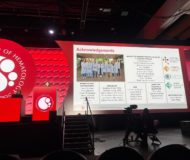

As part of the annual meeting of the American Society of Haematology (ASH) 2024, one of the foremost global events in this field, Dr Ana Caballero, researcher in the Cellular Immunotherapy and Gene Therapy group at the Sant Pau Research Institute (IR Sant Pau) and associate in the Haematology Service led by Dr Javier Briones, delivered an oral presentation on the results of the phase I/II clinical trial of the HSP-CAR30 treatment for patients with refractory or relapsed Hodgkin lymphoma and CD30+ T-cell lymphoma. This innovative cellular therapy, a pioneering development in Europe, was entirely designed and manufactured at the IR Sant Pau and Hospital. It has drawn significant interest due to its safety and efficacy in a patient population with unmet therapeutic needs.
To date, 32 patients have been treated with HSP-CAR30, and plans are in place to enrol an additional 10 patients to further bolster the findings. According to Dr Caballero, this expansion will help confirm the robustness of the preliminary results and establish a firmer basis for the treatment’s future development. The results presented indicate that 55% of patients treated with HSP-CAR30 achieved complete remission of the disease—an impressive figure considering the severity of the studied population. Additionally, it was estimated that 41% of patients would remain progression-free two years post-treatment, an encouraging indicator of the therapy’s potential to provide long-term cancer control.
Dr Ana Caballero highlighted the significance of these results: “What is most encouraging is that the responses are not only effective but also durable, representing a genuine advance for a population with very limited options,” she explained.
The HSP-CAR30 treatment is based on genetically modified CAR T-cell technology, designed to specifically recognise and attack the CD30 antigen present in tumour cells. “We designed a treatment combining a second-generation CAR T-cell with an enriched population of memory T-cells, optimised to deliver a potent and long-lasting response,” explained Dr Laura Escribá, coordinator of CAR T-cell production and quality control within the Cellular Immunotherapy group of the Haematology Service. She added, “The results we are seeing are promising and reflect the team’s effort to offer a solution to patients who have no other therapeutic options.”
One of the most notable features of HSP-CAR30 is its manageable safety profile. During the trial, side effects such as cytokine release syndrome were mostly mild and controllable with available treatments. The incidence of neurotoxicity was minimal, underscoring the therapy’s potential as not only effective but also a safe option. “Our goal was always not just to develop a treatment that works, but also one that is tolerable for patients. We know that quality of life is just as important as survival,” Dr Caballero emphasised.
The initial results also demonstrate significant persistence of the therapeutic effect. According to the data presented, the modified CAR T-cells remain active in the patient’s body for up to 24 months post-infusion, reinforcing their ability to offer lasting tumour control. Dr Caballero explained that the focus on memory T-cells is key to extending the treatment’s benefits: “Our product is designed to last and to continue combating cancer over time. This is particularly important for patients facing aggressive and refractory tumours.”
Hodgkin lymphoma (HL) is known for its high cure rate in the early stages of treatment. However, up to 30% of patients experience recurrence or fail to respond to initial therapies, leaving them in a critical situation with few alternatives. In her presentation at ASH, Dr Caballero stressed the importance of addressing this unmet need: “Hodgkin lymphoma, although treatable in most cases, presents a major challenge when patients fail to respond to conventional treatments. It is precisely in this population that HSP-CAR30 is showing its transformative potential.”
The ASH Congress, recognised as the leading international forum in haematology, was the ideal platform to showcase the potential impact of HSP-CAR30. The presentation generated widespread interest among specialists and experts, who emphasised the importance of further advancing these innovative therapies. Dr Caballero underlined the urgency of continuing research and development of the treatment: “Although the results are encouraging, we know there is still work to be done. These preliminary data are a significant step, but we remain committed to validating and improving this treatment for future patients.”
The development of HSP-CAR30 exemplifies Sant Pau’s leadership in advanced immunotherapy. This project demonstrates how interdisciplinary collaboration and academic research can have a direct and meaningful impact on patients’ lives. “We are proud of what we have achieved so far, but our ultimate goal is for treatments like HSP-CAR30 to become an accessible therapeutic option for patients facing this type of cancer,” concluded Dr Caballero.